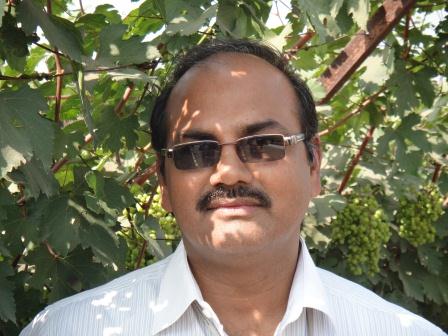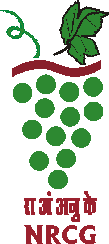Dr. A. K. Upadhyay

Qualification
B. Sc. : 1984-1987 : Agriculture (Soil Science –Elective), Banaras Hindu University, Varanasi, UP.
M.Sc.: 1987-1989 : Soil Science and Agril. Chemistry, Banaras Hindu University, Varanasi, UP.
Ph.D : 1989-1995 : Soil Science, Indian Agriculture Research Institute, New Delhi.
- Crop Production
Specialization / Discipline
- Soil fertility, Nutrient and Water management
Area of specialization
- Nutrient and Water management in grapes, Food safety issues
Current research interest
Principal Scientist (ICAR):
- 01.01.2009– continuing : National Research Centre for Grapes, Pune, MS
Senior Scientist (ICAR):
- 16.10.2002– 31.12.2008 : National Research Centre for Grapes, Pune, MS
- 14.09.2002- 15.10.2002 : Central Plantation Crops Research Institute, Kasaragod, Kerala
Scientist (ICAR):
- 07.10.1994 –13.10.2002 : Central Plantation Crops Research Institute, Kasaragod, Kerala
- 09.02.1994 – 06.09.1994 : Indian Agriculture Research Institute, New Delhi
- 14.09.1993 – 08.02.1994 :- National Academy for Agril. Research Management, Andhra Pradesh
Assistant Development Officer (NABARD):
- 02.11.1992 – 18.07.1993 : Assistant Development Officer NABARD Regional Office, Bhopal, Madhya Pradesh
- He has 18 years of experience in the field of Soil Science. During his period at CPCRI, Kasaragod, he has worked on Integrated nutrient management of palms (Coconut & Arecanut) and onfarm waste composting. Potassium and sulphur adsorption in different coconut growing soils were studied. Geospatial variability of available nutrient pool in different cropping systems was worked out. Mobility of the P and K in soil was worked out in fertigation experiment in arecanut. Integrated nutrient management in coconut based cropping / farming system involving on farm waste recycling and chemical inputs was carried out.
- At NRC Grapes, he is at present working on improving the nutrient and water use efficiency in grapes. Studies on use of mulch and antistress on improving WUE in Thompson Seedless vines have been concluded. A novel technique on application of irrigation water directly at 9” depth leading to substantial saving in irrigation water has been developed. Various nutritional problems like vein reddening, leaf blackening and necrosis, shiny spot, inflorescence necrosis were diagnosed. Fertigation schedule for Thompson Seedless grapevines were also standardised. Studies on nutrient uptake pattern on Thompson Seedless vines raised on ownroot and rootstocks was carried out 110R rootstock being superior to Dogridge in restricting Na uptake grapevines. Presently working on Standardisation of irrigation schedule for Cabernet Sauvignon vines raised on 110R rootstock and techniques to improve nutrient use efficiency in grapevine. Food safety issues in grapes and other crops viz. Peanuts, vegetables are also being monitored.
- Established National Referral Laboratory in the centre for monitoring pesticide residues in grapes for export to European Union. The project involved design and layout of the laboratory, coordination with the construction agencies, procurement of equipments and their installation and all the other arrangements for making the laboratory functional.
M. Sc.- 01
Ph.D.- 02 (ongoing)
- Gold medal for M.Sc (Ag) in Soil Science & Ag. Chem. from Banaras Hindu University, Varanasi.
- Indian Naval Benevolent Association Scholarship in B.Sc. (Ag) & M.Sc.(Ag).
- IARI Senior Research Fellowship for Ph.D in Soil Science.
- Recognised as Ph.D guide for Shivaji University, Kolhapur.
- Part of the Indian delegation to the Netherlands under the framework of Govt. to Govt. project of the Dutch Govt. From 10-15, July, 2011 for strengthening good agricultural practices, tracking and tracing system with accompanying sampling for the residue analysis and exchange of best practices in the field of residue analysis.
- Part of the Expert Group constituted by IGNOU, New Delhi for formulating curriculum framework for the full-time Master’s Degree programme in Food Safety and Quality Management and setting up of the Food Testing Laboratory at the University for training/ teaching purpose.
- Part of the Indian delegation to the UK, Netherlands and Belgium to study the aflatoxin contamination in peanut and peanut products on arrival of consignments exported from India to EU countries from 10-14th June, 2012.
- ‘Best Research Paper Award’ for the year 2010 by The Horticultural Society of India, New Delhi, India-110012.
Trainings:
The Conference was organized by AOAC International and funded by Agricultural and Processed Food Products Export Development Authority (APEDA), Ministry of Commerce, New Delhi under National Referral Laboratory Scheme. The paper entitled ‘Multi-residue screening of 100 pesticides in grapes by gas chromatography-mass spectrometry and liquid chromatography-tandem mass spectrometry’ was presented in the session of ‘Analysis of Contaminants’ as a poster on 18th September 2006. The paper described the standardized method of sampling, extraction, cleanup and final estimation of 100 pesticides in grape matrix. The validation results including linearity range, limit of detection, limit of quantification, precision and accuracy results were reported for all analytes. Two-dimensional GCxGC separation of co-eluted pesticides was presented. The application of the above method in regular monitoring of pesticide residues in grapes under the residue monitoring program of the APEDA on the samples collected from the vineyards and pack-houses of India were demonstrated.
The objective of the programme was to study the effect of Advanced fertigation system in comparison to conventional fertigation on nutrient accumulation and leakage from the system in citrus garden. The experiment was laid out in Dareton in New South Wales (Australia). In this study tensiometers and ceramic cup soil water samplers at two different depths below the root zone were used to calculate deep drainage and nitrate leaching for an AF citrus trial site in the Sunraysia Region. The results showed that drainage was 18.5% and 23 kg NO3-N ha-1 was leached for the period between 30th of August 2007 to the 20th of June 2008. This equated to 16% of the nitrogen applied lost as NO3-N leaching. The results showed that the nitrate concentration in the 1.5 m SoluSAMPLER was regularly over the 10 mg/L NO3-N ha-1 threshold. This method of assessing deep drainage and nitrate leaching has been shown to be a viable option for assessing the environmental impacts of AF, due to nitrate leaching and will help in optimizing fertilizer use in citrus production.
- Publications: (Click to access list)


 91-20-26956040
91-20-26956040 ajay.upadhyay@icar.gov.in
ajay.upadhyay@icar.gov.in